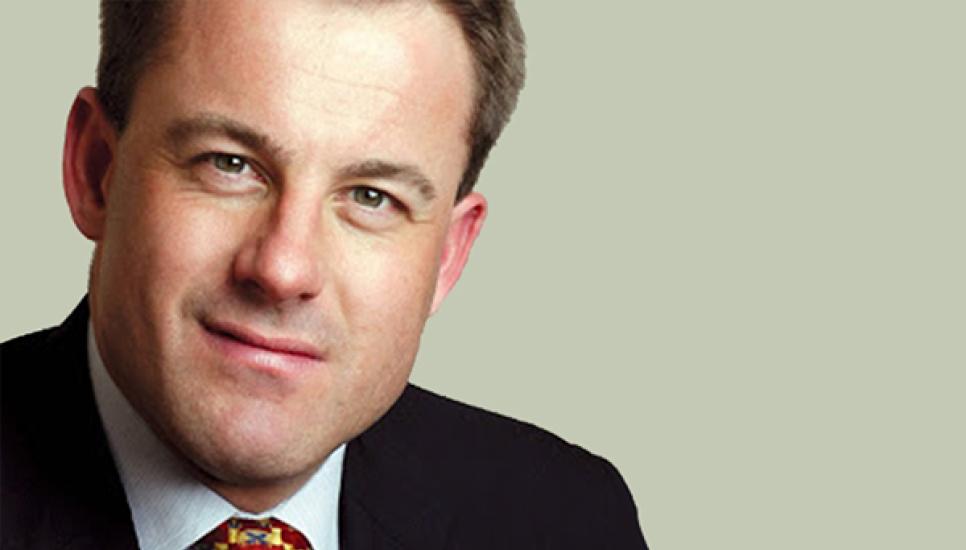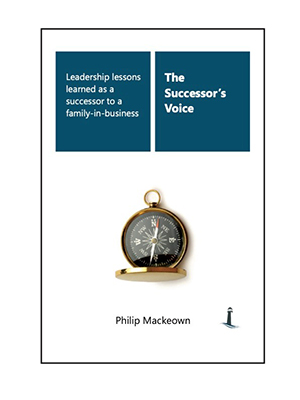Philip Mackeown: Giving voice to family successors

“I wanted to write a book that I would have liked to read when I started out,” says fifth-generation family business owner, family talent advisor and successor development coach and mentor, Philip Mackeown of his reasons for penning The Successor’s Voice.
A practical guide for family members navigating the rocky road to succession by someone who has worked within a multigenerational business for more than 30 years, the book is, says Mackeown, an opportunity to “Share ideas to help people to make better decisions and live better lives as successors and owners. Here, he talks about building up resources, empowering through knowledge-sharing and development of family talent…
What qualifies you to write a book on family business ownership?
Ourfamily now owns a professionally managed business, founded and headquartered in Cork, Ireland. The Musgrave Group is located in the Republic of Ireland, Northern Ireland and the south-east of Spain. We are wholesalers to independent food-retailers (many who are family owned), own and operate our own supermarkets and supply and support - with our foodservice business - those preparing and selling food.
We are in our fifth generation of ownership and intend to remain as a private company. Our company is majority owned by the family with the balance owned by current and past employees. Our unitary board is made up of executives, non-family non-executives and three family directors, and is chaired by a non-family member.
Our family now numbers more than 180 people, who live all over the world. We are as close as geography and time allow, work together to continue family ownership and come together to learn and govern when we can.
I joined the company soon after university, worked for ten years in retail and wholesale operations (in Ireland and Spain) before leaving to undertake a master’s degree and work outside of the family business. Five years later, I joined the board as a family director and worked for two five-year terms. I participated on our family council for more than ten years, where I led the preparation of our next generation of successors and contributed to the drafting of our first family constitution.
I stood down from the board to manage the Irish chapter of the Family Business Network (FBN), which I founded in 2012.

What drove you to write this book?
I wrote this book for successors to families in business – for those family members who follow on from their predecessors at any age and stage. My intent in doing this, is to fill the gap in the knowledge and practical advice for successful succession for and from the point of view of the individual successor.
The aim of this book is to explore and address the question “What should they know of succession, who only succession know?” I write for a contemporary successor, one who is both educated and committed to their professional growth while mindful of their potential contribution to their family and to their families’ business. The book is also about the preparation, development and support of family talent.
What are the main themes you cover?
The book is a resource for individual successors who are attempting to identify and ask the ‘right’ questions and have the courage and perseverance to discover the answers. In looking back at my earned experience over 30 years, I identify the questions I had to face at varying stages as I confronted the inevitable opportunities and challenges that came with ownership. The book is organised around those ‘stages’ and questions.
Second, I organise and present a number of frameworks and summaries to help successors – and those who work with them – organise their thoughts to enable them make informed decisions. Examples of these are six possible successor role profiles, a successor coaching model, a credibility compass and desirable successor assets to be developed over time.
Third, I do not allow the family off the hook (as it were). I identify 12 principles for the development of family talent for consideration by families’, to help shape their thinking, allocate (or not) resources and identify their ‘family talent’ priority.
Fourth, I pull together the themes and models introduced in the book into a Successor Assessment and Self-development model. My aim is to provide a staged approach to successor discovery, decision and contribution, to be used by successors and those who work with them.
Fifth – and finally – the book is written for successors, not at, about or above them; You, not they.

How important is support and where can it be found?
In the book I introduce the family talent principle that successors must design and put in place their own support for optimum performance and contribution. Some elements – a development plan, training, feedback and a succession of roles – (should) originate within the business. If in place, a good start. If not, start there.
However, it is that support which is external to the business which is vital to smooth performance and contribution over time. Three come particularly to mind. First are formal courses for development and learning; a particular follow-on benefit are those life-long relationships formed with peers met on such courses.
Second, and in close association with this, is the opportunity afforded by family membership of networks (or similar organisations) for families-in-business. Access to peers in a confidential setting has infinite support potential for the engaged successor. As the founder of the FBN chapter in Ireland, I saw at first hand the potential and results of peer networking.
 However, a more personal support resource is desirable and at times required. For this look to mentors – those who hold a mirror to us as we move forwards with our lives and roles – and coaches – those who will teach, show, organise and motivate use to change behaviours. These (usually) come from one of two sources – members of professional organisations offering such services to families-in-business or individuals found by (or known to) the individual successor.
However, a more personal support resource is desirable and at times required. For this look to mentors – those who hold a mirror to us as we move forwards with our lives and roles – and coaches – those who will teach, show, organise and motivate use to change behaviours. These (usually) come from one of two sources – members of professional organisations offering such services to families-in-business or individuals found by (or known to) the individual successor.
Successors would do well to push for each of these supports, if not already in place. An ‘external’ mirror provided by course peers, other families and qualified individuals will allow three things. First, external validation and (self) comparison. Second, the receipt of un-varnished feedback and comment one will never receive from ones’ family (or from the managers with whom you work). And finally, a valued other who holds you in unconditional positive regard and will talk you ‘off-the-ledge’ should you need it. And at some time, over the course of a career, you will.
For more information on The Successor’s Voice by Philip Mackeown, click here.






